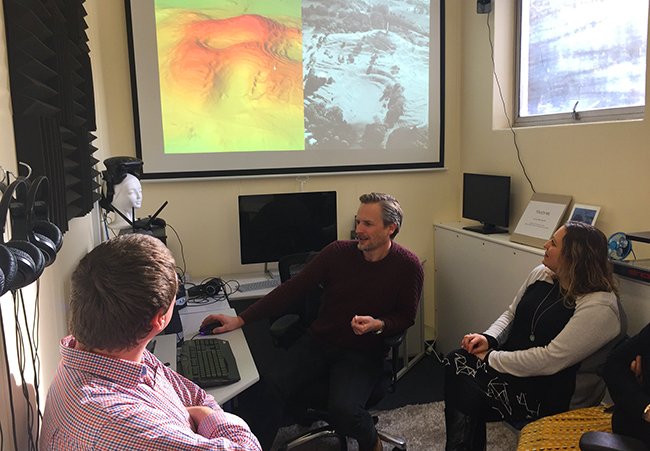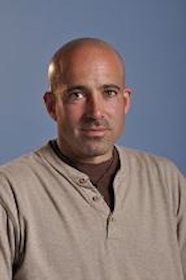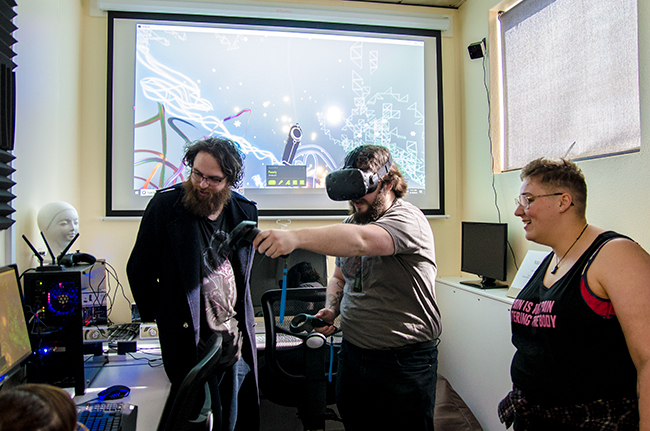Wednesday 12 June 2019 9:48am

Dr Tim Thomas (Archaeology), centre, explains how LIDAR technology shows significant historic sites on prominent geological features in Auckland.
“Create, connect, collaborate” the Digital Humanities Hub – Te Pokapū Matihiko o Te Kete Aronui team has been doing exactly that for several months in a project to raise awareness about innovative local and global, cross-disciplinary research in the “digital realms”.
Since the Hub | Te Pokapū was launched during the Digital Humanities Expo last September, the University of Otago Library has co-ordinated a pilot to open the space on Friday lunchtimes, to enable the University community to explore the space and connect with other teachers, learners and researchers interested in the digital Humanities.
Among a range of topics that have already been covered during the sessions, Librarian Chris Seay demonstrated how to find Humanities data, and make it useable, using OpenRefine and DigitalNZ collections.
Dr Steve Mills (Computer Science) spoke about deep neural networks and their use in identifying letters and words in handwritten documents in the Hocken Library’s Marsden Online archive, and other distinctly New Zealand projects.
Associate Professor Catherine Fowler (Media, Film and Communication) talked about the promise and challenges of audiovisual essays as a research and teaching tool. Last week Dr Tim Thomas (Archaeology) discussed recent projects, including drone mapping at a Nenthorn Silcrete Quarry, and using 3D mapping to capture images of Māori rock art at North Otago sites.
As part of this initiative, the Hub | Te Pokapū – located on the Arts Building’s first floor – has also hosted informal Open Hours discussions, which brought people from different disciplines together to critically discuss issues, tools and projects.
Reflecting on the pilot, which will conclude in late June, Subject Librarian Alexander Ritchie says the sessions achieved their goal.
“We set out to create a welcoming environment for researchers, teachers and learners to discuss digital research and practice, and to raise awareness of the Hub as a divisional resource. We have been privileged to host some fascinating discussions covering topics like digital literatures and literacies, machine learning and text analysis, audiovisual essays and data visualisation,” he says.

Associate Professor David Ciccoricco
English and Linguistics Associate Professor David Ciccoricco said creating new collaborative research opportunities was increasingly important for humanities research.
“The nature of humanities research has changed dramatically in light of digital culture, which means the nature of libraries and, for that matter, librarians has changed too. To me, what’s most exciting about the new Hub is seeing Otago scholars working closely with library staff who have plenty of expertise and enthusiasm in this domain.”
During June, the Hub will again be hosting weekly Open Hours with a mixture of drop-in discovery and discursive dialogue between 12 and 2pm on Fridays.
Humanities Librarians will be in the Hub from 12pm to introduce the space and answer questions.
Open Hours discussions start at 1pm, and this Friday 14 June there will be a screening and discussion of Towards uncertain narratives: Data and stories, Harkanwal Singh’s keynote from the Digital Humanities Expo 2018.
Future sessions in June will include discussions of digital artwork and practice, data wrangling and digital security. Outside of these Open Hours, staff and researchers can book time to use the hub-based technology, or a consult with a librarian.
The Hub | Te Pokapū is a shared Humanities Divisional space housing a creative media suite, linguistics lab and media archaeology display. For more detail about the Hub | Te Pokapū as well as upcoming discussions and events, visit digital-humanities.otago.ac.nz/thenews/ or email alexander.ritchie@otago.ac.nz
Below: ENGL 467 Storyworlds and Cognition students Jesse Watts (left) and Jack Blair watch Brandon Couch (centre) use Tilt Brush software via a virtual reality headset in the new Digital Humanities Hub ahead of its launch during the Digital Humanities Expo last year.

